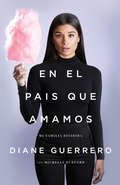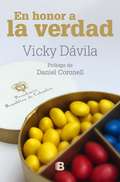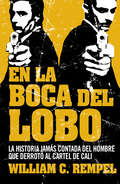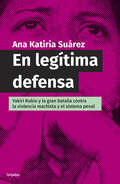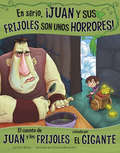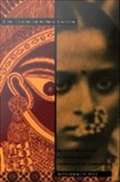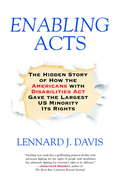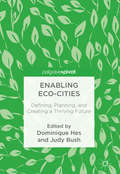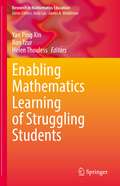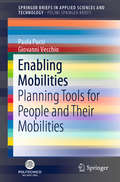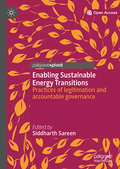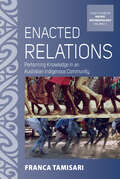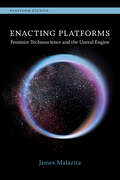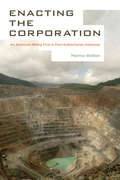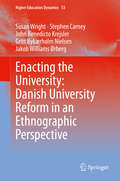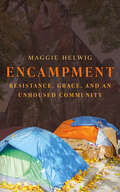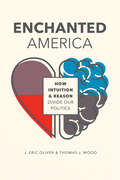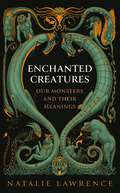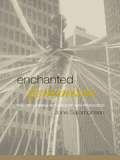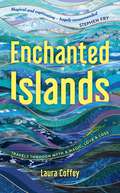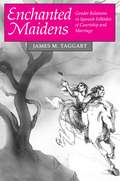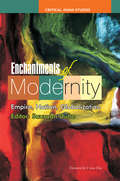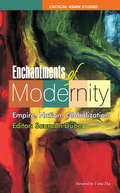- Table View
- List View
En el país que amamos: Mi Familia Dividida
by Diane GuerreroLa estrella de Orange is the New Black y de Jane the Virgin presenta su historia personal acerca de la grave situación en que se encuentran los inmigrantes indocumentados en este país.Diane Guerrero, la actriz de televisión del popular programa Orange is the New Black y de Jane the Virgin, contaba con sólo catorce años cuando un día sus padres y su hermano fueron arrestados y deportados mientras ella estaba en la escuela. Como había nacido en Estados Unidos, Guerrero pudo permanecer en el país y seguir estudiando gracias a la bondad de amigos de la familia, quienes se hicieron cargo de ella y la ayudaron a construir su propio camino y a que se convirtiera en una exitosa actriz de carrera sin tener la red de apoyo de su familia. En el país que amamos es una historia conmovedora y dolorosa sobre la resistencia extraordinaria de una mujer ante las aterradoras luchas que enfrentan los residentes indocumentados de este país. Hay más 11 millones de inmigrantes indocumentados viviendo en Estados Unidos, muchos de los cuales tienen hijos con ciudadanía estadounidense, pero cuya permanencia en este país es tan frágil como la de sus padres y cuyas historias no han sido contadas. Escrita en conjunto con Michelle Burford, esta autobiografía es una historia de triunfo personal que, además, arroja una muy necesaria luz sobre los miedos que permean la vida diaria de familias como la de la autora y sobre un sistema que les falla una y otra vez.
En honor a la verdad
by Vicky DávilaEl valiente testimonio de la periodista Vicky Dávila. En honor a la verdad, de la periodista Vicky Dávila, es un libro complejo. Por un lado, es una lección de periodismo investigativo, donde la perseverancia por descubrir los hechos en contravía de espionaje y amenazas, es una lección de coraje y pasión informativa. De otro lado, es el descarnado testimonio de cómo el poder reacciona cuando se enfrenta a argumentos imbatibles, y operan otro tipo de presiones que coartan la libertad de expresión.
En la boca del lobo: La historia jamás contada del hombre que derrotó al cartel de Cali (Vintage Espanol Ser.)
by William C. Rempe¿Arriesgarías tu vida para salvar tu alma? La historia jamás contada del hombre que derrotó al cartel de Cali. Colombia, en los años noventa, era un país sumido en el caos con un gobierno débil que combatía a la guerrilla y a los narcotraficantes inmersos en una guerra liderada por Pablo Escobar y sus eternos rivales: los hermanos Rodríguez Orejuela, del cartel de Cali. Jorge Salcedo, ingeniero, oficial de la reserva del ejército, un hombre de negocios respetado, padre de familia, que despreciaba a Escobar, entró a formar parte del cartel de Cali para convertirse en el jefe de seguridad de uno de los capos. Salcedo pretendía ignorar la corrupción, la violencia y la brutalidad que lo rodeaba, y luchó por preservar su integridad con grandes dificultades, hasta que un día recibió una orden directa del padrino que no podía cumplir pero tampoco desobedecer. Salcedo comprendió entonces que suúnica salida era traicionar al sindicato del crimen más rico y poderoso de todos los tiempos, arriesgarlo todo e intentar derrotar a los de Cali en un juego a vida o muerte en el que eran muy pocas las posibilidades de ganar. William C. Rempel es el único reportero con acceso directo a Jorge Salcedo y a su historia. Salcedo vive escondido con su familia en algún lugar de Estados Unidos. Nadie, ni siquiera el autor, conoce su paradero. Reseñas:«Un thriller real de ritmo vertiginoso que acelera el corazón.»Kirkus Reviews «Bill Rempel se ha ganado la reputación de mejor reportero de investigación de América, y como los cronistas de antaño, consigue que la gente le cuente historias asombrosas que no revelaría a nadie más. En la boca del lobo pone de manifiesto la maestría de Rempel al desvelar con todo lujo de detalles los secretos de la sangrienta guerra de las drogas en Colombia a partir del testimonio directo de uno de sus principales protagonistas. Al final te das cuenta de que el mayor misterio es que Jorge Salcedo haya logrado sobrevivir el tiempo suficiente para poder contarle su vida a Rempel.»James Risen, autor de Estado de guerra «En este impactante y extraordinario trabajo de no ficción, William Rempel pone de manifiesto la importancia de los reportajes de investigación, logrando acceder a la persona que podría, y de hecho lo hizo, difundir los secretos que desmontaron un cartel tan poderoso como el de Cali. Rempel tiene una historia extraordinaria que contar. No solamente arrastra al lector al oscuro mundo de los carteles de drogas, sino que ofrece también el estudio fascinante de un personaje, un hombre que tendrá que responder a una pregunta terrible: ¿Debe arriesgar su vida para salvar su alma o mantener un pacto con el diablo?»David Grann, autor de La ciudad perdida de Z y El diablo y Sherlock Holmes
En legítima defensa: Yakiri Rubio y la bran batalla contra la violencia machista y el sistema penal
by Ana Katiria Suárez CastroLa estremecedora historia de la joven y su larga lucha por obtener libertad y justicia. Una narración cruda e intensa de una mujer que se enfrentó a la violencia machista, a las instituciones patriarcales, a la corrupción del sistema penal... Y ganó. En diciembre de 2013, la joven Yakiri Rubio fue secuestrada por dos hombres que la condujeron a un hotel para violarla. Después de ultrajarla, uno de ellos intentó asesinarla. Ella acabó matando al agresor en defensa propia; sin embargo, la acusaron de homicidio calificado y la encarcelaron. La autora de este libro, Ana Katiria Suárez, es la abogada penalista que defendió a Yakiri Rubio. En una carrera contra el tiempo, después de haber tenido acceso a un expediente mutilado, su objetivo desde el primer momento fue demostrar que Yakiri actuó en legítima defensa tras haber sufrido una violación sexual. Con la pasión que caracterizó su defensa, la autora relata los pormenores de un proceso viciado desde el origen, repleto de omisiones, fallas y contubernios entre los delincuentes y la autoridad. Muy pronto, el caso se convirtió en una lucha personal por los derechos humanos y en una cruzada jurídica con perspectiva de género. Otros autores han opinado: "¡Qué sería de este país de machos donde campean la violencia, la misoginia y el odio, sin mujeres como Ana Katiria! ¡Qué sería de nosotros sin esas voces, como la suya, que no sólo claman justicia, sino que son capaces de arrancársela a un régimen que sistemáticamente nos la niega!" -Epigmenio Ibarra-
En serio, ¡Juan y sus frijoles son unos horrores!: El cuento de Juan y los frijoles contado por el gigante (El otro lado del cuento)
by Eric BraunOF COURSE you think I was the bad guy, terrifying poor little Jack. You don't know the other side of the story. Well, let me tell you... Fully translated Spanish text. SEGURO que piensas que yo soy el malo del cuento y que me dedico a aterrorizar al pobre Juan. No conoces el otro lado de la historia. Pues bien, te la voy a contar…
En-Gendering India: Woman and Nation in Colonial and Postcolonial Narratives
by Sangeeta RayEn-Gendering India offers an innovative interpretation of the role that gender played in defining the Indian state during both the colonial and postcolonial eras. Focusing on both British and Indian literary texts--primarily novels--produced between 1857 and 1947, Sangeeta Ray examines representations of "native" Indian women and shows how these representations were deployed to advance notions of Indian self-rule as well as to defend British imperialism. Through her readings of works by writers including Bankimchandra Chatterjee, Rabindranath Tagore, Harriet Martineau, Flora Annie Steel, Anita Desai, and Bapsi Sidhaa, Ray demonstrates that Indian women were presented as upper class and Hindu, an idealization that paradoxically served the needs of both colonial and nationalist discourses. The Indian nation's goal of self-rule was expected to enable women's full participation in private and public life. On the other hand, British colonial officials rendered themselves the protectors of passive Indian women against their "savage" male countrymen. Ray shows how the native woman thus became a symbol for both an incipient Indian nation and a fading British Empire. In addition, she reveals how the figure of the upper-class Hindu woman created divisions with the nationalist movement itself by underscoring caste, communal, and religious differences within the newly emerging state. As such, Ray's study has important implications for discussions about nationalism, particularly those that address the concepts of identity and nationalism. Building on recent scholarship in feminism and postcolonial studies, En-Gendering India will be of interest to scholars in those fields as well as to specialists in nationalism and nation-building and in Victorian, colonial, and postcolonial literature and culture.
Enabling Acts
by Lennard J. Davis<P>The first significant book on the history and impact of the ADA--the "eyes on the prize" moment for disability rights. <P>The Americans with Disabilities Act (ADA) is the widest-ranging and most comprehensive piece of civil rights legislation ever passed in the United States, and it has become the model for disability-based laws around the world. Yet the surprising story behind how the bill came to be is little known. <P>In this riveting account, acclaimed disability scholar Lennard J. Davis delivers the first behind-the-scenes and on-the-ground narrative of how a band of leftist Berkeley hippies managed to make an alliance with upper-crust, conservative Republicans to bring about a truly bipartisan bill. <P>Based on extensive interviews with all the major players involved including legislators and activists, Davis recreates the dramatic tension of a story that is anything but a dry account of bills and speeches. Rather, it's filled with one indefatigable character after another, culminating in explosive moments when the hidden army of the disability community stages scenes like the iconic "Capitol Crawl" or an event some describe as "deaf Selma," when students stormed Gallaudet University demanding a "Deaf President Now!" <P>From inside the offices of newly formed disability groups to secret breakfast meetings surreptitiously held outside the White House grounds, here we meet countless unsung characters, including political heavyweights and disability advocates on the front lines. "You want to fight?" an angered Ted Kennedy would shout in an upstairs room at the Capitol while negotiating the final details of the ADA. Congressman Tony Coelho, whose parents once thought him to be possessed by the devil because of his epilepsy, later became the bill's primary sponsor. There's Justin Dart, adorned in disability power buttons and his signature cowboy hat, who took to the road canvassing fifty states, and people like Patrisha Wright, also known as "The General," Arlene Myerson or "the brains," "architect" Bob Funk, and visionary Mary Lou Breslin, who left the hippie highlands of the West to pursue equal rights in the marble halls of DC. <P>Published for the twenty-fifth anniversary of the ADA, Enabling Acts promises to ignite readers in a discussion of disability rights by documenting this "eyes on the prize" moment for tens of millions of American citizens.
Enabling Creative Chaos: The Organization Behind the Burning Man Event
by Katherine K. ChenThis book examines the Burning Man organization to show how we have the agency to mold organizational experiences more to our liking.
Enabling Eco-Cities
by Dominique Hes Judy BushCities are striving to become more resilient, adaptive and sustainable; this requires new ways of governing and developing the city. This book features chapters by researchers using regenerative development and transitions theories to envisage how Eco-Cities could be planned, designed and created, and concludes with practical tools and an outline of how this evolution could be facilitated. It examines two major questions: How can we use understandings of Eco-Cities to address the legacy of urban built form and existing practices which often make it difficult to create the systemic changes needed? And what are the elements of complex urban places and spaces that will enable the planning, creation and evolution of thriving cities?The book will appeal to planners, city makers, urban researchers, students and practitioners, including planners, designers, architects and sustainability managers, and all those seeking to envisage the steps along the path to thriving cities of the future.
Enabling Mathematics Learning of Struggling Students (Research in Mathematics Education)
by Yan Ping Xin Ron Tzur Helen ThoulessThis book provides prospective and practicing teachers with research insights into the mathematical difficulties of students with learning disabilities and classroom practices that address these difficulties. This linkage between research and practice celebrates teachers as learners of their own students’ mathematical thinking, thus contributing an alternative view of mathematical progression in which students are taught conceptually. The research-based volume presents a unique collaboration among researchers in special education, psychology, and mathematics education from around the world. It reflects an ongoing work by members of the International Group for the Psychology of Mathematics Education (PME) and the North American Chapter of the PME Working Groups. The authors of chapters in this book, who have been collaborating extensively over the past 7 years, are from Australia, Canada, the United Kingdom, and the United States.
Enabling Mobilities: Planning Tools for People and Their Mobilities (SpringerBriefs in Applied Sciences and Technology)
by Paola Pucci Giovanni VecchioThis book investigates how established transport planning tools can evolve to understand and plan for the ever-changing contemporary mobilities that influence the opportunities available to individuals. It discusses existing techniques, revised in the light of the growing interest in the social implications of transport planning decisions: these include analytical tools to interpret consolidated and emerging phenomena, as well as operational tools to tackle new and existing mobility demands and needs. The book then addresses the implications of everyday mobility for individuals and communities. The result of a continuous exchange between the two authors, it brings together the results of their various research projects. Despite referring to different objects and settings, the work presented is connected by an underlying interest in the impact that mobility has on people in an increasingly mobile world, and the need to include such concerns into mobility planning and policy.
Enabling Sustainable Energy Transitions: Practices of legitimation and accountable governance
by Siddharth SareenThis open access book reframes sustainable energy transitions as being a matter of resolving accountability crises. It demonstrates how the empirical study of several practices of legitimation can analytically deconstruct energy transitions, and presents a typology of these practices to help determine whether energy transitions contribute to sustainability.The real-world challenge of climate change requires sustainable energy transitions. This presents a crisis of accountability legitimated through situated practices in a wide range of cases including: solar energy transitions in Portugal, urban energy transitions in Germany, forestland conflicts in Indonesia, urban carbon emission targets in Norway, transport electrification in the Nordic region, and biodiversity conservation and energy extraction in the USA. By synthesising these cases, chapters identify various dimensions wherein practices of legitimation construct specific accountability relations. This book deftly illustrates the value of an analytical approach focused on accountable governance to enable sustainable energy transitions. It will be of great use to both academics and practitioners working in the field of energy transitions.
Enabling Urban Alternatives: Crises, Contestation, and Cooperation
by Lee Pugalis Jens Kaae Fisker Letizia Chiappini Antonella BruzzeseThis book asks how thinking, governing, performing, and producing the urban differently can assist in enabling the creation of alternative urban futures. It is a timely response to the ongoing crises and pressing challenges that inhabitants of cities, towns, and villages worldwide are faced with in the midst of what has been widely dubbed as ‘an urban age’. Starting from the premise that current urban development patterns are unsustainable in every sense of the word, the book explores how alternative patterns can be pursued by the wide variety of actors – from governments and international institutions to slum-dwellers and social movements – involved in the on-going production of our shared urban condition. The challenges addressed include exclusion and segregation; persisting poverty and increasing inequality; urban sprawl and changing land use patterns; and the spatial frames of urban policy. As such the book appeals to urban scholars, policy makers, activists, and others concerned with shaping the future of our cities and of urban life in general. Additionally, it is of interest to students in urban planning, architecture and design, human geography, urban sociology, and related fields.
Enacted Relations: Performing Knowledge in an Australian Indigenous Community (ASAO Studies in Pacific Anthropology #15)
by Franca TamisariThe Yolngu Indigenous people in the Northeast Arnhem Land of Australia respond to neo-colonial challenges by continuing to affirm their political autonomy and transmit ‘Yolngu Law’, which are ways of knowing and being with the younger generation. They deal with non-indigenous institutions, through participation of bodies, language, things, images of movement and notions of mutual care, feelings and accountability. This book explores the Yolngu relational ontology and epistemology in the context of everyday practices, ritual ceremonies, bicultural education, vernacular Christianity and the production of popular music.
Enacting Platforms: Feminist Technoscience and the Unreal Engine (Platform Studies)
by James MalazitaAn analysis of the game engine Unreal through feminist, race, and queer theories of technology and media, as well as a critique of the platform studies framework itself.In this first scholarly book on the Unreal game engine, James Malazita explores one of the major contemporary game development platforms through feminist, race, and queer theories of technology and media, revealing how Unreal produces, and is produced by, broader intersections of power. Enacting Platforms takes a novel critical platform studies approach, raising deeper questions: what are the material and cultural limits of platforms themselves? What is the relationship between the analyst and the platform of study, and how does that relationship in part determine what &“counts&” as the platform itself? Malazita also offers a forward-looking critique of the platform studies framework itself.The Unreal platform serves as a kind of technical and political archive of the games industry, highlighting how the techniques and concerns of games have shifted and accreted over the past 30 years. Today, Unreal is also used in contexts far beyond games, including in public communication, biomedical research, civil engineering, and military simulation and training. The author&’s depth of technical analysis, combined with new archival findings, contributes to discussions of topics rarely covered in games studies (such as the politics of graphical rendering algorithms), as well as new readings of previously &“closed&” case studies (such as the engine&’s entanglement with the US military and American masculinity in America&’s Army). Culture, Malazita writes, is not &“built into&” software but emerges through human practices with code.
Enacting the Corporation
by Marina WelkerWhat are corporations, and to whom are they responsible? Anthropologist Marina Welker draws on two years of research at Newmont Mining Corporation's Denver headquarters and its Batu Hijau copper and gold mine in Sumbawa, Indonesia, to address these questions. Against the backdrop of an emerging Corporate Social Responsibility movement and changing state dynamics in Indonesia, she shows how people enact the mining corporation in multiple ways: as an ore producer, employer, patron, promoter of sustainable development, religious sponsor, auditable organization, foreign imperialist, and environmental threat. Rather than assuming that corporations are monolithic, profit-maximizing subjects, Welker turns to anthropological theories of personhood to develop an analytic model of the corporation as an unstable collective subject with multiple authors, boundaries, and interests. Enacting the Corporation demonstrates that corporations are constituted through continuous struggles over relations with--and responsibilities to--local communities, workers, activists, governments, contractors, and shareholders.
Enacting the University: Danish University Reform in an Ethnographic Perspective (Higher Education Dynamics #53)
by Susan Wright Stephen Carney John Benedicto Krejsler Gritt Bykærholm Nielsen Jakob Williams ØrbergThis book examines the transformative power and the limitations of one of Europe’s most significant university reforms from an ethnographic and historical perspective. It incorporates voices positioned across university and policy-making hierarchies in its analysis of how Danish universities have been transformed. To do this, the book continually juxtaposes two meanings of ‘enactment’: a top-down view based on laws and institutional power, and a bottom-up view of multiple actors shaping their institution in day-to-day life and in actively contested changes. By conceiving of the university as ‘enacted’ in both ways at once, the book explores how and why the university comes to be imagined and instantiated in new ways. The book traces the arguments for reform through a two-decade long, dynamic struggle between international forums and national industrial, political and academic interests over the definition of the university. It discusses which ideas finally became dominant and how this happened. It looks at government reforms from 2003 onwards, and, by means of notable ‘telling moments’, explains how the governance and management of the university were transformed. It examines how academics found room to manoeuvre between contesting discourses that affect their identity and work. Finally, it shows how students engaged with new versions of historical debates about their participation in shaping their own education, their institution and society.
Encampment: Resistance, Grace, and an Unhoused Community
by Maggie Helwig"Striking, elegant." – Publishers Weekly, ★ STARRED Review"An activist priest provides sanctuary for an encampment of unhoused people in her churchyardThe housing crisis plaguing major urban centres has sent countless people into the streets. In spring 2022, some of them found their way to the yard beside the Anglican church in Toronto’s Kensington Market, where Maggie Helwig is the priest. They pitched tents, formed an encampment, and settled in. Known as an outspoken social justice activist, Helwig has spent the last three years getting to know the residents and fighting tooth and nail to allow them to stay, battling various authorities that want to clear the yard and keep the results of the housing crisis out of sight and out of mind. Encampment tells the story of Helwig’s life-long activism as preparation for her fight to keep her churchyard open to people needing a home. More importantly, it introduces us to the Artist, to Jeff, and to Robin: their lives, their challenges, their humanity. It confronts our society’s callousness in allowing so many to go unhoused and demands, by bringing their stories to the fore, that we begin to respond with compassion and grace.
Enchanted America: How Intuition and Reason Divide Our Politics
by J. Eric Oliver Thomas J. WoodAmerica is in civic chaos, its politics rife with conspiracy theories and false information. Nationalism and authoritarianism are on the rise, while scientists, universities, and news organizations are viewed with increasing mistrust. Its citizens reject scientific evidence on climate change and vaccinations while embracing myths of impending apocalypse. And then there is Donald Trump, a presidential candidate who won the support of millions of conservative Christians despite having no moral or political convictions. What is going on? The answer, according to J. Eric Oliver and Thomas J. Wood, can be found in the most important force shaping American politics today: human intuition. Much of what seems to be irrational in American politics arises from the growing divide in how its citizens make sense of the world. On one side are rationalists. They use science and reason to understand reality. On the other side are intuitionists. They rely on gut feelings and instincts as their guide to the world. Intuitionists believe in ghosts and End Times prophecies. They embrace conspiracy theories, disbelieve experts, and distrust the media. They are stridently nationalistic and deeply authoritarian in their outlook. And they are the most enthusiastic supporters of Donald Trump. The primary reason why Trump captured the presidency was that he spoke about politics in a way that resonated with how Intuitionists perceive the world. The Intuitionist divide has also become a threat to the American way of life. A generation ago, intuitionists were dispersed across the political spectrum, when most Americans believed in both God and science. Today, intuitionism is ideologically tilted toward the political right. Modern conservatism has become an Intuitionist movement, defined by conspiracy theories, strident nationalism, and hostility to basic civic norms. Enchanted America is a clarion call to rationalists of all political persuasions to reach beyond the minority and speak to intuitionists in a way they understand. The values and principles that define American democracy are at stake.
Enchanted Creatures: Our Monsters and Their Meanings
by Natalie LawrenceThe hydra rears its many heads in a flurry of teeth and poisonous fumes. The cyborg lays waste to humanity with a ruthless, expressionless stare.From ancient mythology to modern science fiction, we have had to confront the monsters that lurk in the depths of our collective imagination. They embody our anxieties and our irrational terrors, giving form to what we don't wish to know or understand. For millennia, monsters have helped us to manage the extraordinary complexity of our minds and to deal with the challenges of being human.In Enchanted Creatures, Natalie Lawrence delves into 15,000 years of imaginary beasts and uncovers the other-worldly natural history that has evolved with our deepest fears and fascinations. Join Lawrence on a tour of prehistoric cave monsters, serpentine hybrids, deep-sea leviathans and fire-breathing Kaiju. Discover how this monstrous menagerie has shaped our minds, our societies and how we see our place in nature.
Enchanted Feminism: The Reclaiming Witches of San Francisco (Religion and Gender)
by Jone SalomonsenThis is the first major study of the most famous Reclaiming Witch community, founded in 1979 in San Francisco, written by an author who herself participated in a coven for ten years. Jone Salomonsen describes and examines the communal and ritual practices of Reclaiming, asking how these promote personal growth and cultural-religious change.
Enchanted Islands: A Mediterranean Odyssey – A Memoir of Travels through Love, Grief and Mythology
by Laura CoffeyEnchanted Islands tells the true story of Laura Coffey's epic journey around the mystical archipelagos of the Mediterranean. Blending memoir, travel and nature writing with tales from The Odyssey, and infused with sharply comic wit, this is a celebration of the redemptive powers of cold-water swimming and luminous star-lit skies.
Enchanted Maidens: Gender Relations in Spanish Folktales of Courtship and Marriage
by James M. TaggartSpanish villagers tell many folktales that describe in metaphorical language the struggles of young men and women as they emerge from their parental families and join in love. In this book James Taggart presents dozens of orally transmitted tales, including "Snow White," "Cinderella," "Beauty and the Beast," "Blancaflor," and dragonslayer stories, collected from seven villages in the region of CNBceres, and analyzes the differences in male and female approaches to telling them. His study shows how men and women use the tales to grapple with some of the contradictions found in gender relations in their culture, which conditions men to be sexually assertive and to marry virgins and which teaches women to fear the men who court them. Taggart interprets the male-female dialogue voiced through storytelling by linking the content of specific tales to the life experiences and gender of the storyteller. Men and women, he finds, carry out an exchange of ideas by retelling the same stories and altering the plots and characters to express their respective views of courtship. This indirect narrative dialogue conveys an understanding of the opposite sex and establishes a common model of marriage that permits men and women to overcome their fear of each other and bond in heterosexual love.
Enchantments of Modernity: Empire, Nation, Globalization (Critical Asian Studies)
by Saurabh DubeThe notion of modernity hinges on a break with the past, such as superstitions, medieval worlds, and hierarchical traditions. It follows that modernity suggests the disenchantment of the world, yet the processes of modernity also create their own enchantments in the mapping and making of the modern world. Straddling a range of disciplines and perspectives, the essays in this edited volume eschew programmatic solutions, focusing instead in new ways on subjects of slavery and memory, global transformations and vernacular and vernacular modernity, imperial imperatives and nationalist knowledge, cosmopolitan politics and liberal democracy, and governmental effects and everyday affects. It is in these ways that the volume attempts to unravel the enchantments of modernity, in order to approach anew modernity's constitutive terms, formative limits, and particular possibilities.
Enchantments of Modernity: Empire, Nation, Globalization (Critical Asian Studies)
by Saurabh DubeThe notion of modernity hinges on a break with the past, such as superstitions, medieval worlds, and hierarchical traditions. It follows that modernity suggests the disenchantment of the world, yet the processes of modernity also create their own enchantments in the mapping and making of the modern world. Straddling a range of disciplines and perspectives, the essays in this edited volume eschew programmatic solutions, focusing instead in new ways on subjects of slavery and memory, global transformations and vernacular and vernacular modernity, imperial imperatives and nationalist knowledge, cosmopolitan politics and liberal democracy, and governmental effects and everyday affects. It is in these ways that the volume attempts to unravel the enchantments of modernity, in order to approach anew modernity's constitutive terms, formative limits, and particular possibilities.
